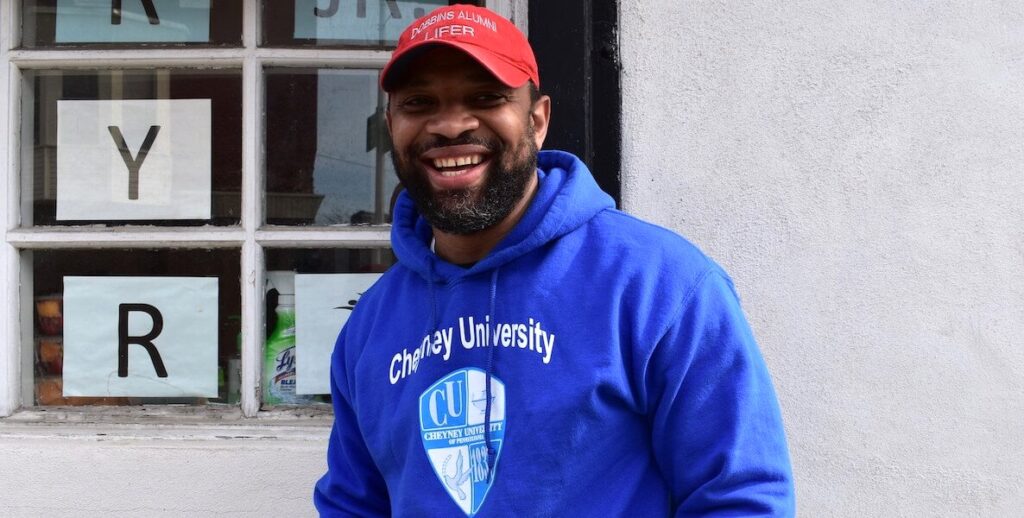In parts of North Philadelphia, you are more likely to live within walking distance of a Dollar Store than a grocery store. That means frozen snack foods have become largely accessible while the nearest fresh produce could be a 20-minute bus ride away.
According to Hunger Free America, about 18 percent of Philadelphia residents live in homes the federal government classifies as “food insecure,” often in neighborhoods that are food deserts, with no nearby supermarket—and that was before Covid-19 came to Philly.
It’s something he credits to his education at Dobbins Technical High School. “We enter to learn, we leave to serve,” Walker says. “That’s the motto at Dobbins.”
An urge to help others
A native of the neighborhood, Walker once used the 19th Street office space as his campaign headquarters when he ran for state representative several years ago. Although he lost the race, he found himself with an office, a community and an urge to help others.
Through continuous rolling partnerships with various grocery stores, Walker and a group of volunteers have been able to provide hundreds of people with fresh fruit, vegetables, pet food, eggs, milk and bread on a regular basis since 2016.
Early in the morning, the team journeys to Whole Foods, which donates food to the Unity Center twice a week. Back at the Center, they distribute the food into bags for the residents of North Central Philly, not far from Temple University’s campus. This operation feeds hundreds of families on a weekly basis.
Beyond food distribution, Walker opens his office to help local residents—particularly those without internet access—search for jobs, create resumes, send emails or faxes.
“What we do here is try to provide resources for people,” Walker explains. “It warms my heart when someone comes up to me and says, ‘We were able to pay our utility bill, because we can rely on getting food from your office.’”
Lines down the block in the wake of Covid-19
Instability caused by the pandemic has pushed more people towards the Unity Center. From 100 to 200 bags of food a day, Walker says they’re now handing out 300 bags of food, and to a wider swath of the community. Walker is used to seeing lines down the block for his services; now, the people in line include not just his predominantly African-American clientele, but also white and Asian neighbors.
The increase has put a strain on Walker himself. “I use my money to keep the office open, I pay the rent and utilities,” he says. “I’m basically taking food out of my own family’s mouth… It’s been difficult. I’ve had to make decisions on whether or not to keep the office open. What do I do? Do I try to save my resources or do I keep the doors open?”
As a man of faith, Walker says he felt obligated to keep the doors open. Then, in May, Unity Center received a grant from a foundation of Beech Corporations aimed at supporting community services. It’s enough, Walker says, to keep the lights on for “a couple months. … That’s God making the way for me.”
Not just a food distribution center
Walker, who has a biology degree from Cheyney University, formerly worked at Girard College, and now does criminal justice reform work as part of the Police-Assisted Diversion program of the Police Department. This allows him to see the issues facing his community up close and personal, as well as the issues facing a new generation.
“I believe when people don’t have adequate resources, they are more likely to do crime—go to a market and steal, retail theft, robbery,” says Walker. He sees the work of the Unity Center not just as food distribution, but crime prevention. The premise, he says, is simple: if you have food at home you will be less likely to steal.
“I believe when people don’t have adequate resources, they are more likely to do crime—go to a market and steal, retail theft, robbery,” says Walker. The premise, he says, is simple: if you have food at home you will be less likely to steal.
The food distribution service has become a mainstay for many in the community. “Ken saved my life,” says Rodney Scott, a volunteer at the Unity Center. “If I wasn’t here, I’d still be selling on the corner.”
Scott grew up one block away from the Unity Center and credits it with keeping
Given the precarious nature of running a nonprofit in even the best of circumstances, the future of the Walker Junior Unity Center is uncertain. Walker, though, hopes to remain open with the help of partnerships and grants to ease the financial burden on himself.
“We are a small organization, I never really thought people would have interest in what we do here,” he says. “But I continue to do the work.”

